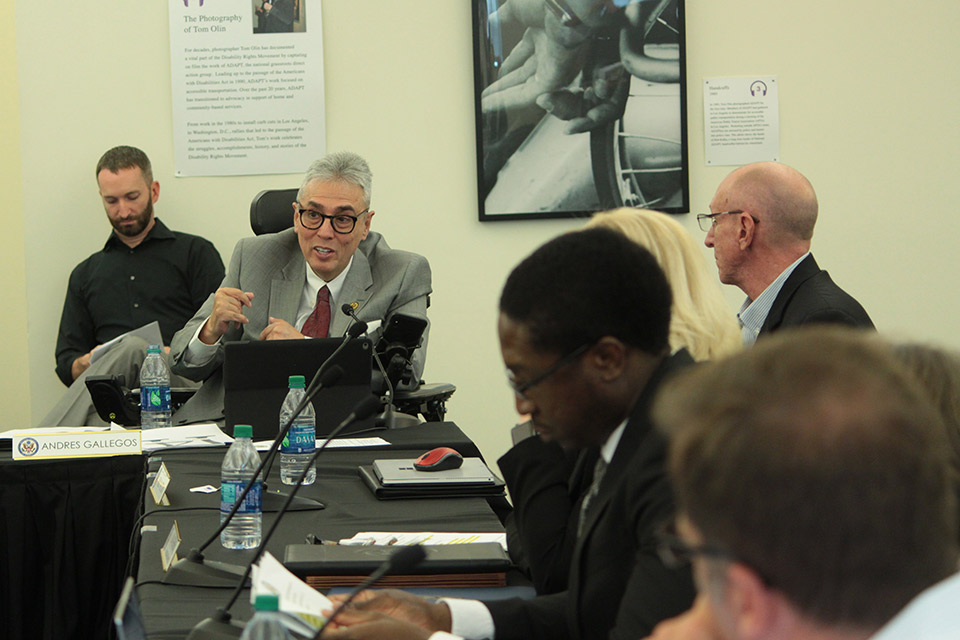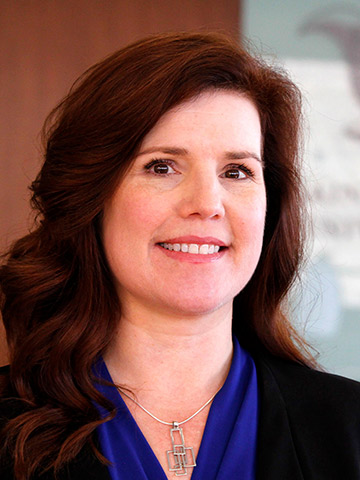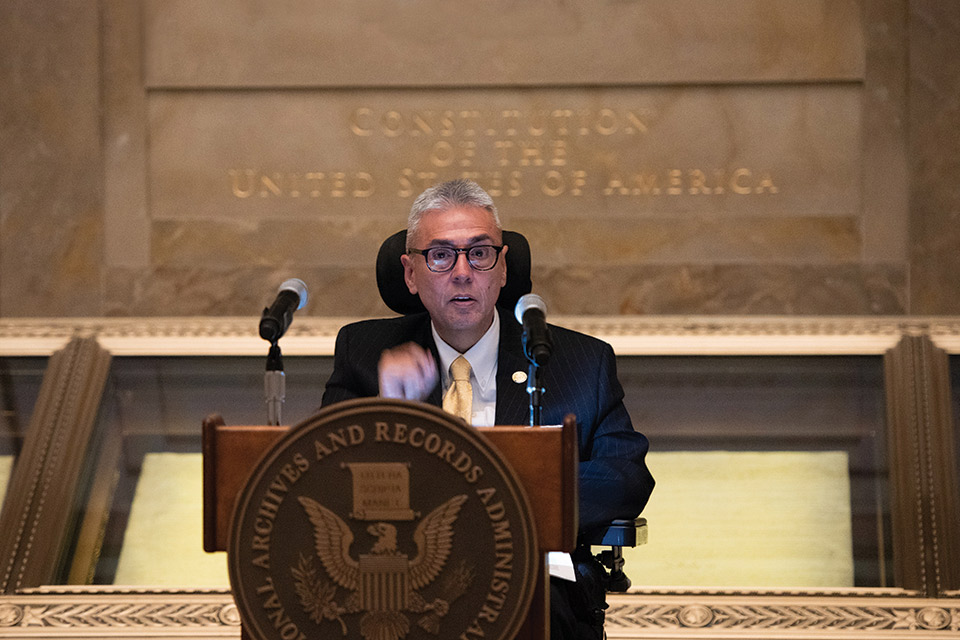Putting Purpose into Practice
Andrés J. Gallegos (’93): The Unexpected Advocate
On Jan. 20, 2021, as one of his first acts in office, President Joe Biden appointed U.S. Air Force veteran and disability rights attorney Andrés J. Gallegos chairman of the National Council on Disability.
When Andrés Gallegos graduated from Saint Louis University School of Law in 1993, he had big plans.
“I thought I was this young, hot shot international trade attorney,” he said. “NAFTA had just passed, and Chicago was a hot market for businesses eager to do work in Mexico and South America, so that was my primary focus at that point in corporate law.”
Three years later, Gallegos was in a horrific car accident that would alter the course of his life. He sustained a spinal cord injury that resulted in quadriplegia. “It doesn’t define who I am; it just defines how I get around in terms of this wheelchair.”
Because of that wheelchair, he began experiencing discrimination in health care systems.
“I was new to that,” he said. “I was never transferred onto an examination table [at my doctor’s office]. When I was denied an eye examination at one of the national optometry chains because I could not independently transfer out of my wheelchair, I was told ‘If you go to our other stores in Chicago you’ll have the same problem.’ The beautiful thing about Chicago is you have competitors on every block, so I went across the street and was told the same thing, and then went to another company and was told the same thing. That annoyed me to no end. I started reaching out. It wasn’t isolated to Chicago; it certainly wasn’t isolated to me. That’s when I decided something needed to be done about it.”
After sustaining a life-altering injury, you try to find a purpose for that happening."
Gallegos
Gallegos filed a class action lawsuit against seven of the largest eye care providers in the U.S. to make services accessible and prevailed. Today, he says, in any of these chains, the examination chair will roll out of the way so a wheelchair can be positioned in its place, and the exam equipment can be maneuvered accordingly.
“After sustaining a life-altering injury, you try to find a purpose for that happening,” Gallegos said. “I thought with my legal background, this was something I needed to address.”
He founded a national disability rights practice in Chicago at Robbins, Salomon & Patt, Ltd., and has continued in that role as shareholder, focusing on both disability rights and health care law. A notable aspect of his practice is that it goes beyond litigation and employs a three-pronged approach to “attain accessible healthcare services for persons with disabilities and effectuate systemic change” — education, advocacy and litigation when necessary.
"We problem-solve,” he said. “Part of that is educating the disability community on what their legal rights are. We also educate health care providers. We conduct workshops at medical schools, we speak to residents of specific hospitals, and we’re starting to work with interested parties across the country in developing curriculum on disability cultural competency and what their legal obligations are, so it’s all part of the process.
“And then when we do find a health care system that is discriminating against people with disabilities, our first approach is to try to collaborate with them using a process called Structured Negotiation,” he continued. “If that fails, we’re not beyond filing a lawsuit if warranted.”
As Gallegos learned more about disability rights work, he got more involved in the community.
“The more I advocated for myself, the more I knew I needed to advocate for others,” he said. As a 14-year veteran of the U.S. Air Force, public service was a natural fit.
 He was appointed in 2010 by then-Illinois Gov. Pat Quinn to be a member of the Governor’s
Task Force on Employment and Economic Opportunities for People with Disabilities.
He was the co-chairman of Illinois in Motion, a coalition that worked on spinal cord
injury cure research funding.
He was appointed in 2010 by then-Illinois Gov. Pat Quinn to be a member of the Governor’s
Task Force on Employment and Economic Opportunities for People with Disabilities.
He was the co-chairman of Illinois in Motion, a coalition that worked on spinal cord
injury cure research funding.
And it was as the chairman of the board of directors for Access Living of Metropolitan Chicago, one of the preeminent centers for independent living in the country, that Gallegos' work caught the attention of Sen. Tammy Duckworth (D-Ill.). In 2018, when then-Senate Minority Leader Chuck Schumer (D-N.Y.) sought to fill a vacancy on the National Council on Disability — a nonpartisan federal agency that advises the U.S. president, Congress and other federal agencies on disability policy — he turned to Duckworth for recommendation. She recommended Gallegos, whom Schumer then appointed to the Council in February of that year.
Three years later, on Day One of his administration, President Joe Biden appointed Gallegos as chairman of the Council. In this role, Gallegos will work closely with the White House’s Domestic Policy Council led by Susan Rice.
“If you’d asked me 24 years ago [after the accident] did I envision this — being designated as a presidential adviser on all matters of disability — absolutely not!” Gallegos said. “It was an incredibly humbling experience.”
Gallegos serves on the Council from Chicago, frequently employing remote technologies to communicate with council staff and federal partners. Once the pandemic subsides he plans to travel to Washington, D.C., a couple of times a month.
Gallegos said his tenure as chairman will have a “laser focus” on addressing COVID-19 issues for persons with disabilities, whom he notes have been disproportionately affected by the virus, not because of their disability, per say, but because of underlying health conditions that put them at greater risk of adverse outcomes.
"I firmly believe that our ability to learn, our ability to earn, and our ability to live is predicated on maintaining good health,” he said. “There is a significant history of devaluing the lives of people with disabilities throughout the country, particularly as it relates to public health programs and interventions, so we’re seeing the repercussions of that continue to take place in truly life and death circumstances.”
Gallegos officially outlined his vision in a searing statement released by the Council on Feb. 16, noting that COVID-19 is:
“A pandemic that has unmasked the most extreme and deadly form of state-sanctioned ableism manifested in discriminatory crisis standards of care and rationing policies that in many instances categorically defined persons with disabilities as persons whose lives are not worth treating, and whose lives are not worth vaccinating or vaccinating with any urgency. A pandemic that has given license to many healthcare professionals to publicly express their explicit bias against persons with disabilities.”
In addition to COVID-19 issues, he plans to tackle accessibility to health care, dental care and behavioral health; addressing social determinants of health that contribute to disparities in outcomes; addressing bias in healthcare settings; advocating for dedicated funding for home and community-based services; strengthening federal nondiscrimination rights; advocating for the protection of direct service providers and family caregivers; addressing communications needs of persons who have visual, aural or cognitive impairments; and many more health- and non-health-related issues.
No small feat, in other words. But then again, Gallegos never had small plans to begin with.
Disability Education in Law School
 Andrés Gallegos had high praise for SLU LAW’s Elizabeth Pendo, the Joseph J. Simeone Professor of Law, who is a nationally recognized expert in
disability law and health care law.
Andrés Gallegos had high praise for SLU LAW’s Elizabeth Pendo, the Joseph J. Simeone Professor of Law, who is a nationally recognized expert in
disability law and health care law.
“I am a huge admirer and fan of Elizabeth Pendo and her work,” he said. “There are maybe a handful of law schools focusing on accessible health care issues and perhaps none in the manner that she’s doing. It shines a bright light on the law school. She’s a pioneer in this area and is incredibly well respected in all circles.”
Since the pandemic began, Prof. Pendo has authored and co-authored an enormous volume of scholarship about disability rights in the context of COVID-19, including “The Americans with Disabilities Act in the COVID-19 Workplace,” “Blocked from the Ballot Box: People with Disabilities,” and “Resolving Tensions Between Disability Rights Law and COVID-19 Mask Policies,” to name a few.
Pendo teaches Bioethics, Civil Procedure I & II, Disability Law, Health Care Ethics, and Health Care Law.
— By Maria Tsikalas
